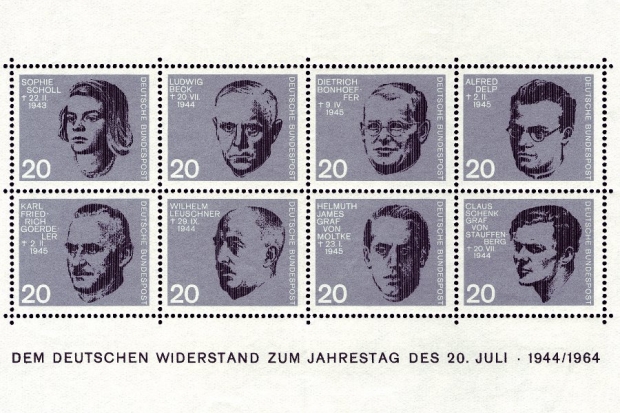Repressing the Nazi Past in West Germany: German Resistance Postage Stamps (1964)
Abstract
The postwar West German government needed to rehabilitate the German military not only among NATO allies but also in the eyes of its own population. To that end, it cultivated a new redemptive postwar patriotism, which saw the issuance of commemorative stamps on the twentieth anniversary of the July 20, 1944, plot to assassinate Hitler at his Wolf’s Lair in East Prussia. The series included the most controversial protagonist in that failed attempt, Colonel Claus Count von Stauffenberg (1907-1944), who was executed the next day. General Ludwig Beck (1880-1944) was likewise arrested for his involvement in the July 20th plot and shot the very same day. The series also included Helmuth James Count von Moltke (1907-1945), a German jurist and founding member of the Kreisau Circle, an influential group in the German resistance to Hitler. A member of one of Germany’s most prestigious noble families, this younger Moltke was also the great-grandnephew of Helmuth von Moltke the Elder (1800-1891), the storied Prussian field marshal from the Franco-Prussian War who represented a famous brand of historic German militarism.
Other well-known figures included the young Munich university student Sophie Scholl (1921-1943), who was executed along with other members of the student resistance group known as the White Rose in 1943, and the Lutheran pastor and theologian Dietrich Bonhoeffer (1906-1945). The other figures include a mixture of political and religious dissidents. The eight individuals who were commemorated were all murdered during the Third Reich. By grouping various individual resisters into one overarching, undifferentiated German resistance movement, the stamp series put military resisters on a par with widely revered student resisters and clergymen.
Source

Source: Reproduction: Peter Steinbach, The 20th of July 1944 – More than a Day of Reflection and Duty, Bundeszentrale für politische Bildung, https://www.bpb.de/geschichte/nationalsozialismus/dossier-nationalsozialismus/39636/der-20-juli-1944?p=all
Bundeszentrale für politische Bildung
Further Reading
Jörg Echternkamp, Soldaten im Nachkrieg: Historische Deutungskonflikte und westdeutsche Demokratisierung 1945-1955. Berlin/Boston: De Gruyter Oldenbourg, 2014.
Philipp Gassert and Alan E. Steinweis, eds., Coping with the Nazi Past. West German Debates on Nazism and Generational Conflict, 1955-1975. New York: Berghahn Books, 2013.
Christina Morina, Legacies of Stalingrad: Remembering the Eastern Front in Germany since 1945. Cambridge and New York: Cambridge University Press, 2011.
Maja Zehfuss, Wounds of Memory: The Politics of War in Germany. Cambridge and New York: Cambridge University Press, 2007.